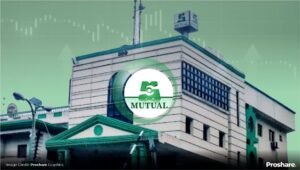
This picture taken on January 29, 2016 in Lagos shows 1000 naira banknotes, Nigeria's currency. - Nigeria's central bank governor, Godwin Emefiele, on January 26 dismissed calls to devalue the naira in his monetary policy committee statement. Instead he chose to continue propping up the currency at 197-199 naira to the dollar and maintain foreign-exchange restrictions. As a result, the naira on the black market is hovering around a record low of 305, fuelling complaints from domestic and foreign businesses who can't access dollars required for imports. (Photo by PIUS UTOMI EKPEI / AFP) (Photo by PIUS UTOMI EKPEI/AFP via Getty Images)
By Abibat Aliu
Experts have identified the Central Bank of Nigeria’s (CBN) excessive printing of money without a corresponding rise in national productivity as a major factor fueling rising inflation in the country.
The experts, while reacting to the August inflation rate of 20.52percent, which showed an increase from the 19.64% recorded in July this year argued that aside from imported inflation coming from most of Nigeria’s trading partners – US, China and Europe triggered by high energy prices, the nation’s high rising inflation is a monetary problem, strongly correlated to increase in money supply, even as broad money that stood at N20 trillion in 2015 now stands N49 trillion in 2022.
According to them, the short-term solution to the high inflation is to mop up the excess liquidity in the economy by raising interest rates further and adopting the Open market operations (OMO) approach by the CBN.
Specifically, Head of Equity Trading, Planet Capital, Paul Uzum
said the medium to a long-term solution to rising inflation is fiscal discipline and eliminating perpetual fiscal deficit and printing of new money to finance it.
said the medium to a long-term solution to rising inflation is fiscal discipline and eliminating perpetual fiscal deficit and printing of new money to finance it.
“There is little the government can do to checkmate imported inflation as long as we operate an open economy and import goods from other countries.
“It will be eliminated within 1-2 years when inflation rate in the world big économies fall back to their normal 1%-3% range but we need to adopt more fiscal discipline and improve productivity.”
Professor of Finance, University of Nigeria Nsukka, Chuke Nwude said due to rising insecurity and foreign Exchange shortage, farmers are no longer free to go to their farms to cultivate while manufacturing firms on the other hand cannot also produce optimally due to scarcity of raw materials.
According to him, the consumer price index is a prime inflation indicator and the costs of goods is very high and still getting high on daily basis as a result of these factors.
” It is not surprising that such a level of inflation is occurring as it is. The National Bureau of Statistics (NBS) is even economical with the truth. Honestly, it should be more than that if accurate inventory is taken.
“We are in a consumer nation with money but don’t have enough goods to buy. Our leadership is totally lame with no plan on the ground to resuscitate the ailing economy. It’s very annoying,” he said.
Chief Executive Officer of Wyoming Capital and Partners, Tajudeen Olayinka said the 20.52% inflation number for the month of August 2022 is an indication that demand side management tools deployed by the CBN to tame inflation may be aggravating the situation, given the fact that most of the factors responsible for inflation in Nigeria are traceable to the supply side of the economy.
According to him, these supply-side factors had been there and largely unresolved before the emergence of imported inflation that came as a result of the Russia-Ukraine war.
Furthermore, he listed factors impacting negatively on the nation’s economy including exchange scarcity and exchange rate mismanagement, Unending insecurity and limited access to farms.
Others are crude oil theft and inability to meet OPEC production quota; high cost of raw materials; infrastructure deficit and high cost of capital.
He warned that more Nigerians are being dragged into extreme poverty due to poor purchasing power and heightening unemployment, a situation that will further hurt the nation’s economy.
Olayinka also belated the fiscal authorities, describing it as weak, with no positive contribution to move the economy forward, other than to engage in excessive borrowing and fiscal rascality which also worsens inflation.
He said: “Nigeria’s economy is in dire need of drip and blood infusion. It will be difficult for CBN’s demand-side management tools to solve the problem.
“This is not to say CBN is not aware of possible failure of its demand side management tools, or that raising interest rate will not sufficiently address the current inflationary pressure.
“The apex bank must also act to address the possible threat of a reversal of capital flow, arising largely from an interest rate hike in Europe and America.”
Olayinka submitted that while the global inflationary threat is dealt with by the more advanced economies, Nigeria’s fiscal authority should continue to search for solutions to some of the self-inflicted supply-side problems bedevilling the economy.
The NBS has said the inflation rate rose to 20.52 per cent in August 2022 from the 19.64% in July 2022.
The “CPI Report August 2022,” which made this known explained that “In August 2022, on a year–on–year basis, the headline inflation rate was 20.52%.”
This, according to the report, was 3.52% points higher compared to the rate recorded in August 2021, which was (17.01%).
It added that “this shows that the headline inflation rate increased in the month of August 2022 when compared to the same month in the preceding year (i.e.August 2021).”





